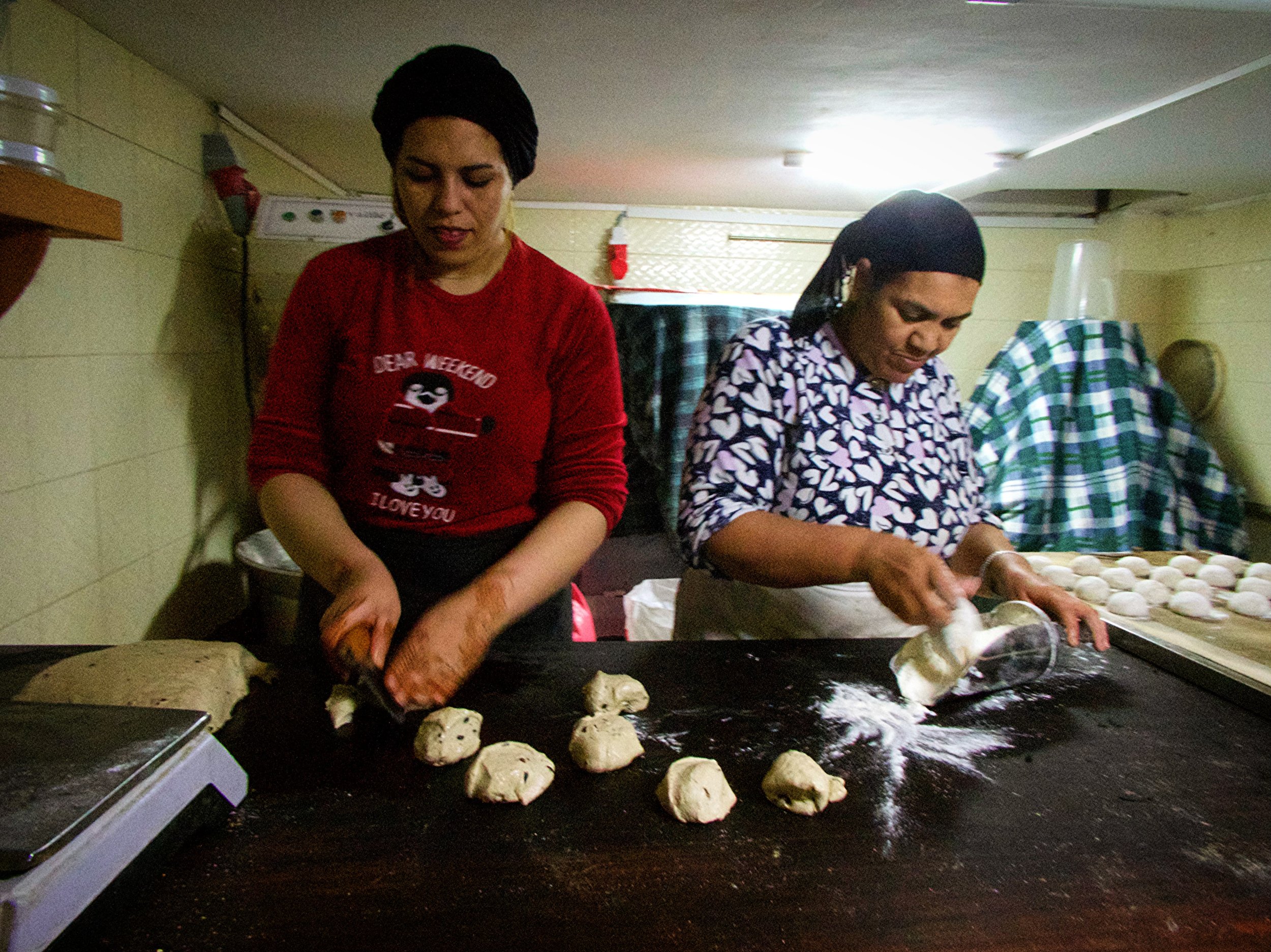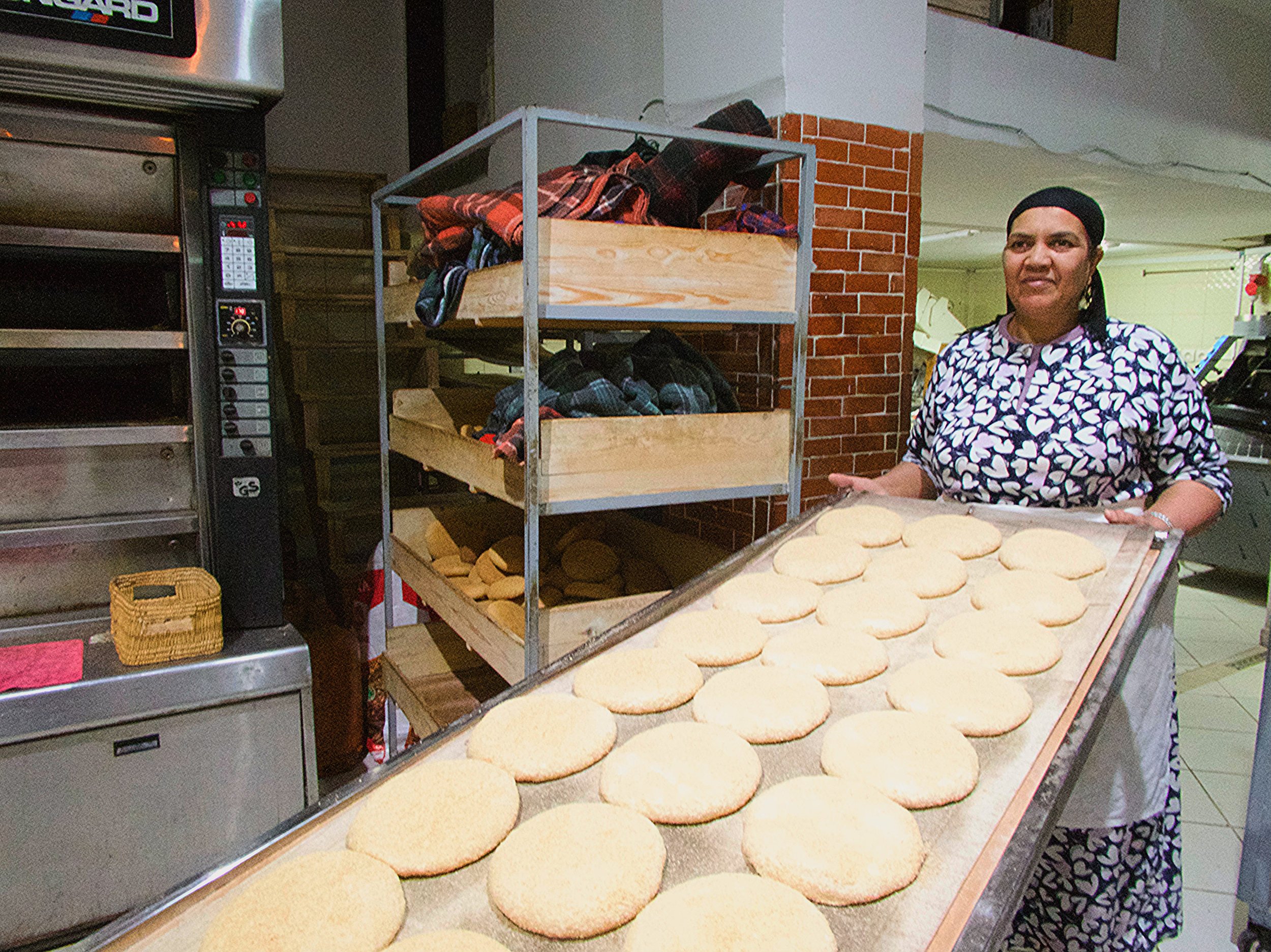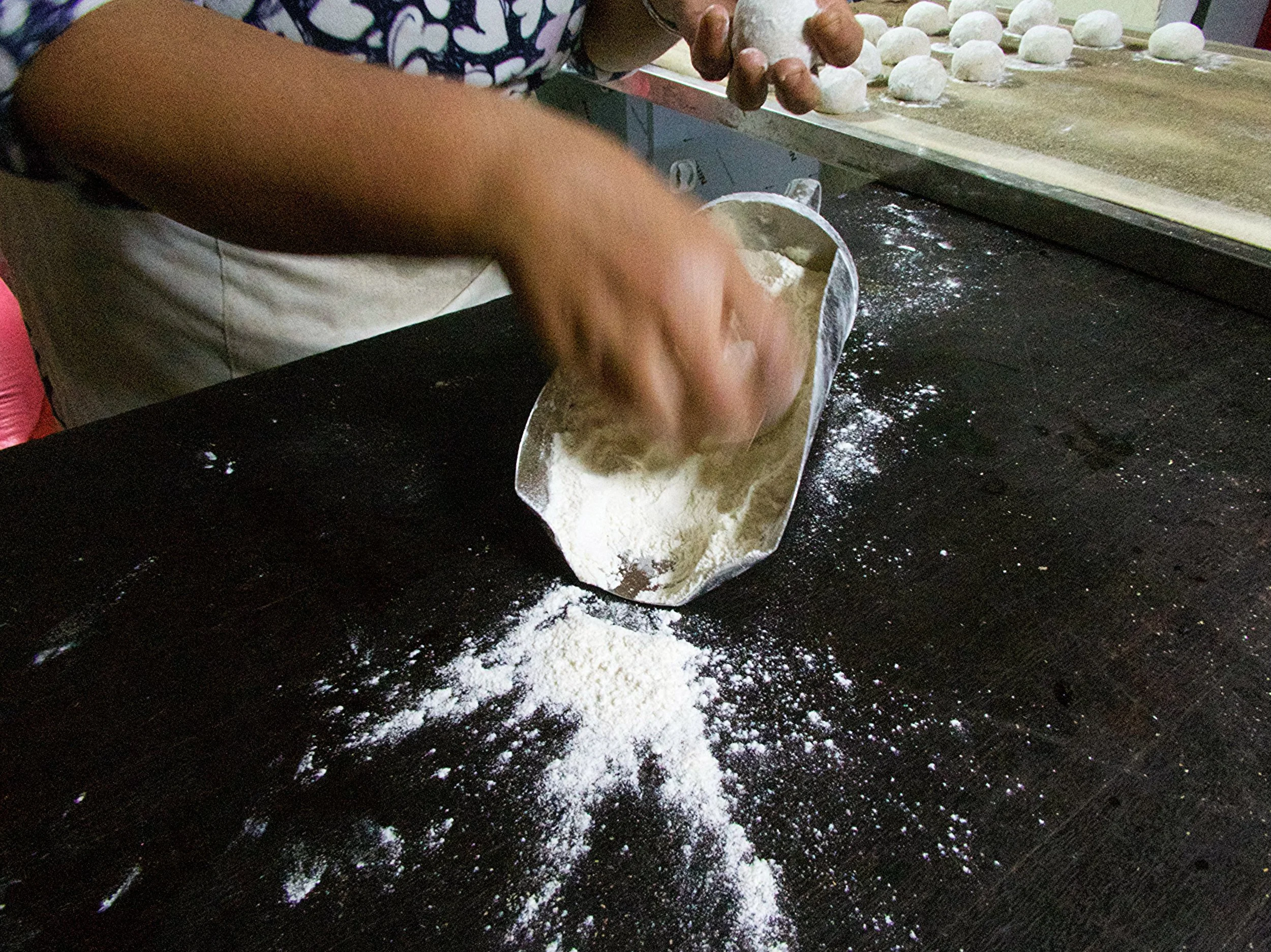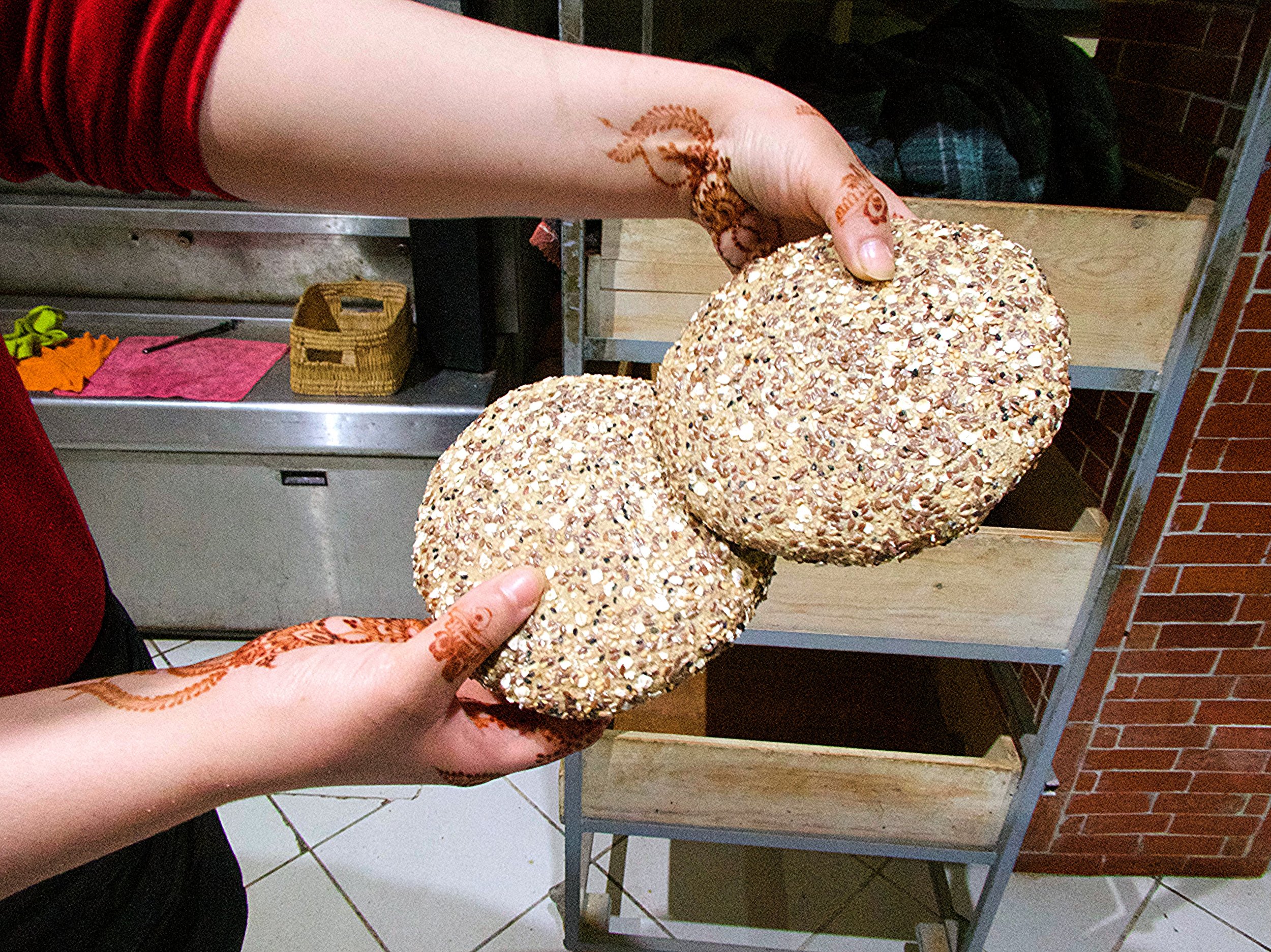“Her hands have sweetness in them” - bread baking, Morocco
After an afternoon bakery class, I cheekily ask Sif, the owner of Aux Pains du Monde, if I can come back and annoy his bakers one morning. To bake bread with them.
“Of course,” he says, “this is your home.”
“What time works?”
“They come at 5am. Siham will be here, and Khadija. Maybe you can arrive at 9 or 10?”
I enter compromise mode. Part early bird, part resistance to the suggestion that I can’t hack bakery life.
“What about 7?” Not super early, so they can get their doughs’ proving without interruption.
“As you like” he says.
The plan is set.
Siham and Khadija
It is, unsurprisingly, still dark when I arrive. There are wild donkeys in the square that the bakery opens onto. Their night time city foraging over, they’re heading east, following the mosaic of streets to amble through a gap in the wrought iron fence surrounding the sandy forest to snooze away the day’s sun.
I watch them for a moment. Elongated ears flicking back and forth, necks stooped towards the ground, trudging gently. It’s tempting to head with them.
The bakery frontage is open, its double concertinaed doors drawn back to reveal stacked chairs squeezed between shop frontage and counter.
The air is sweet with bread baking, but I’m distracted by my British sensibilities. There’s nowhere obvious to knock.
I make an attempt on the counter-top, but it’s solid and I don’t fancy bruised knuckles. I check the calendar event I made in my phone to make sure I have the right name.
“Siham?” I call.
There’s silence.
“Oui?” An uncertain response.
Later we laugh about this. Siham had wondered whose voice I was. We’d never met before, so this early morning roll call was unexpected.
I take her yes as an invitation, stoop my neck round the corner of the partitioning wall. Siham and Khadija are standing on one side of the worktop, side by side. I explain my appearance, they smile, “No problem.”
Flour, dough, heat. I’m into the smog of a Moroccan morning bakery.
Khadija at one end of the tray for the oven
In front of me the industrial oven is open. Its shelves are bare. Siham and Khadija pass in front of me, each either end of a four foot tray. It reminds me of a stretcher.
Khadija places one end in and steps back, Siham pushes the tray all the way in, then steps back, pulling it with her. The long fabric binding around the tray rolls, leaving the proved bread in the oven. She shuts the door.
“Can I help?” I ask, always more comfortable with dough in my hands than a camera.
“Bien sur!” Siham says, and her and Khadija smile at me. Between us the only language we have in common is shaping, cutting, patting dough into shape.
Bread rolls proving
We start with the most common bread in Morocco. Sold in single pieces, it’s flat, round, and textured with semolina. Many dishes here are for sharing - tagine, shakshuka, omelette. The bread is your vehicle.
They use fresh yeast, lots of it. The distinctive smell takes me back to the years of my Dad brewing under the stairs in our small house. It means the dough, fresh from the industrial mixer, is growing as Siham weighs out each piece.
Khadija and I take them, roll them into a ball, then gently push our fingers of both hands into the dough, easing it out whilst spinning it on the semolina-ed surface below. Enough to entice it, not so much to break it.
Rolling olive bread in flour
As they rise on their long trays, we start stoning olives. Siham and Khadija work with fluency. It’s like watching a sportsperson excel - the diver’s perfect entry to the water, the gymnast’s balanced dismount, a deadly accurate tennis forehand down the line.
“This is my mother” says Siham gesturing sideways at Khadija with her floury fingers.
Their bakery dance routine makes sense. Khadija was Siham’s guide to the kitchen. Now they work shoulder to shoulder. Siham translates what she has told me to Khadija. They turn and give me the same, generous smile.
They place a pile of stones in front of me to take a photo, a staging to suggest that I am anywhere near as competent as they are. These black olives are for bread rolls that will be enjoyed at a restaurant in the medina - La Table Madada. I wonder whose story will meet my efforts at dinner time, whose story has crossed their’s so many times before.
At this point, Yousra arrives. She greets me with a hug and a smile, puts a pot of tea on, and asks for the review of my work from Siham and Khadija.
There is a big laugh. I panic.
“They say you are better than I was when I first started.” Khadija says something to Siham, Siham mockingly punches the next ball of bread to be shaped, Yousra laughs even harder, “They say that I punch the bread!”
The sun has risen, the tea is ready. I cut small long dough cylinders flavoured with spicy paprika, herbs, olives. Little diagonal savoury bites to be baked low and slow in the oven until crunchy. Siham shows me the way with her henna’ed hands on a small wooden chopping board.
Trays of bread go into the oven, come out again. As I work, sweet treats appear, balanced on a corner of a tupperware, the edge of the flour pile I’m working on, by the tea I’m drinking. Khadija leaves for home. She smiles and holds my hands as she leaves, and I say goodbye in my best Arabic.
We sit and eat cheese omelette together. The first customers of the day arrive, asking for their bread. It is still warm from the oven, wrapped in heavy blankets on wooden shelves. Yousra asks how my morning was.
“They are very talented,” I say, “To prepare so much and so well. And always with a smile.”
She laughs, and translates to Siham. “Yes,”Yousra replies and then motions to Siham, smiling, “Her hands have sweetness in them.”





